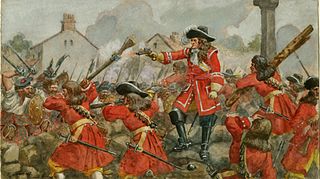Related Research Articles

Jacobitism was a political movement that supported the restoration of the senior line of the House of Stuart to the British throne. The name derives from the first name of James II and VII, which in Latin translates as Jacobus. When James went into exile after the November 1688 Glorious Revolution, the Parliament of England argued that he had abandoned the English throne, which they offered to his Protestant daughter Mary II, and her husband William III. In April, the Scottish Convention held that he "forfeited" the throne of Scotland by his actions, listed in the Articles of Grievances.

Patrick Sarsfield, 1st Earl of Lucan, born c.1655 – 21 August 1693), was an Irish soldier, and leading figure in the Jacobite army during the 1689 to 1691 Williamite War in Ireland.

The Williamite War in Ireland, March 1689 to October 1691, also known as Irish: Cogadh an Dá Rí or "War of the two kings", took place from March 1689 to October 1691. Fought between supporters of James II and his successor, William III, it resulted in a Williamite victory. It is generally viewed as a related conflict of the 1688 to 1697 Nine Years' War.
This is a list of people who have served as Lord Lieutenant of Louth.
Patrick Tyrrell, O.F.M. was an Irish prelate of the Roman Catholic Church who served as the Bishop of Clogher (1676–1689), Vicar Apostolic of Kilmore (1678–1689), and Bishop of Meath (1689–1692). A prominent Jacobite, he was appointed Chief Secretary for Ireland in 1688.
Colonel James Porter (fl.1686–1701) was an Irish politician and supporter of the Catholic King James II.
Sir Michael Creagh was an Irish politician and soldier.
Sir Redmond Everard, 4th Baronet was an Irish Jacobite baronet and politician.

The Jacobite rising of 1689 was a conflict fought primarily in the Scottish Highlands, whose objective was to put James II & VII back on the throne, following his deposition by the November 1688 Glorious Revolution. Named after "Jacobus", the Latin for James, his supporters were known as 'Jacobites' and the associated political movement as Jacobitism. The 1689 rising was the first of a series of rebellions and plots seeking to restore the House of Stuart that continued into the late 18th century.
Sir Patrick Trant, known as Sir Patrick Trant, 1st Baronet between 1686 and 1691, was an Anglo-Irish politician and Jacobite.
Sir Patrick Barnewall, 3rd Baronet was an Irish Jacobite politician and baronet.
Sir Gregory Byrne, 1st Baronet was an Irish Jacobite soldier and politician.
Sir John Everard, 3rd Baronet was an Irish Jacobite soldier and politician.
Miles de Courcy was an Irish Jacobite politician.
Nicholas Browne, 2nd Viscount Kenmare was an Irish Jacobite politician and soldier.
Colonel Nicholas Cusack was an Irish Jacobite politician and soldier.
Walter Nangle was an Irish Jacobite politician and soldier.
Mark Baggot was an Irish Jacobite politician and soldier.
Francis Plowden was an English Jacobite politician, official and courtier, who rose to prominence while serving James II of England in Ireland.
Colonel Matthew Hore was an Irish Confederate and Jacobite politician and soldier.
References
- ↑ O'Hart, John, The Irish Parliament of King James the Second in 1689, Irish Pedigrees: or the Origin and Stem of the Irish Nation (5th Ed., 1892), Volume 2. Retrieved 23 February 2023.
- ↑ EVERARD, Patrick. Officers of the Jacobite Armies, Centre for Robert Burns Studies, University of Glasgow. Retrieved 23 February 2023.